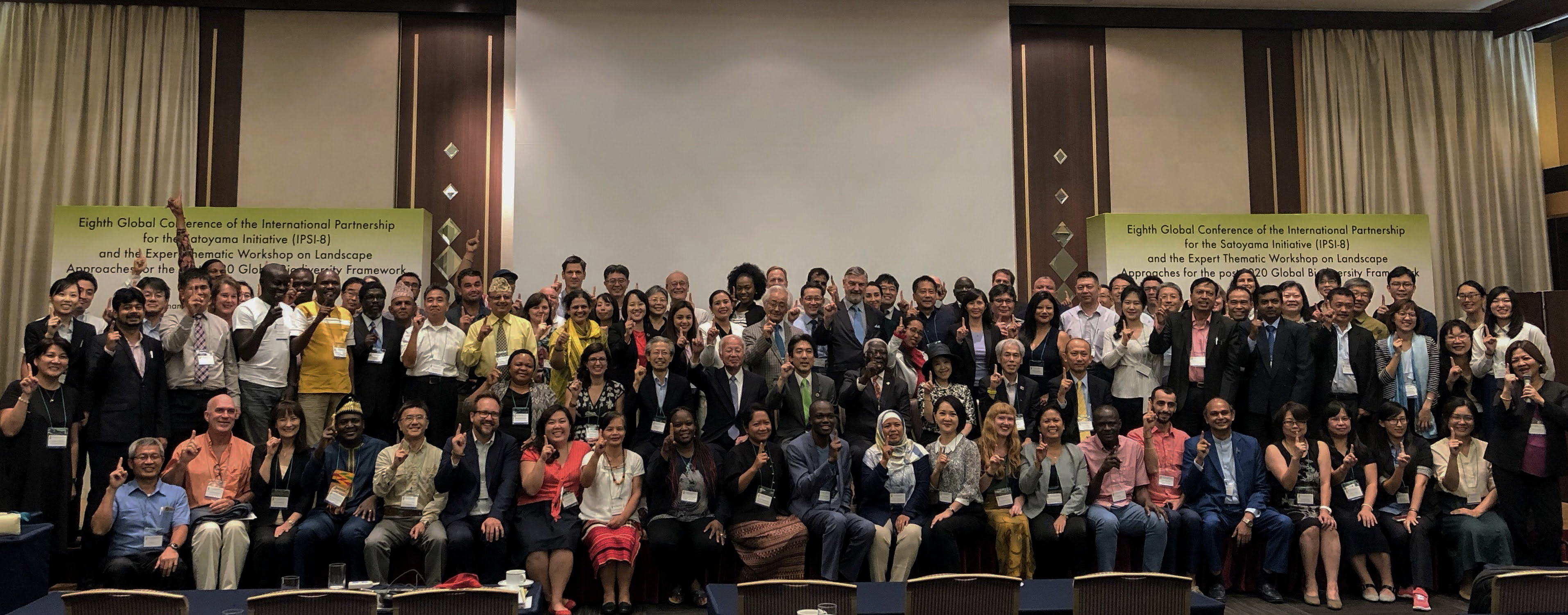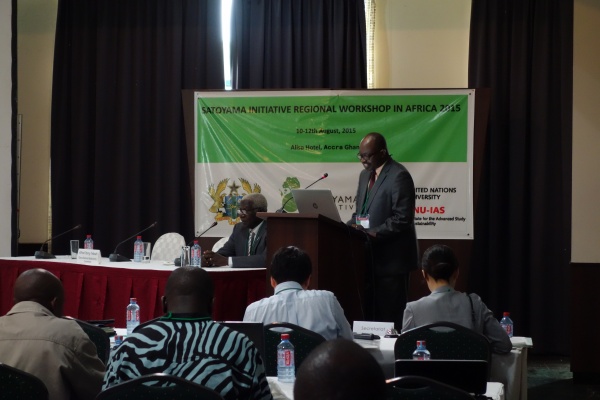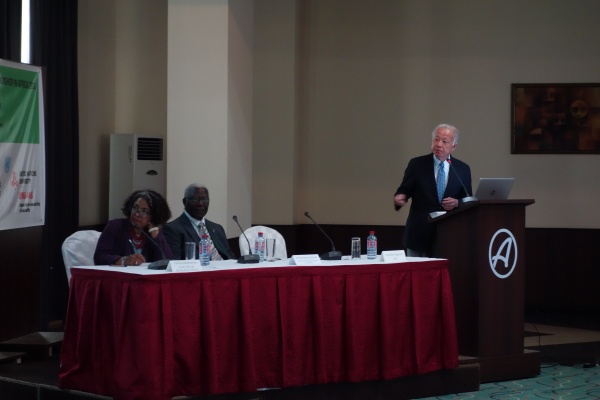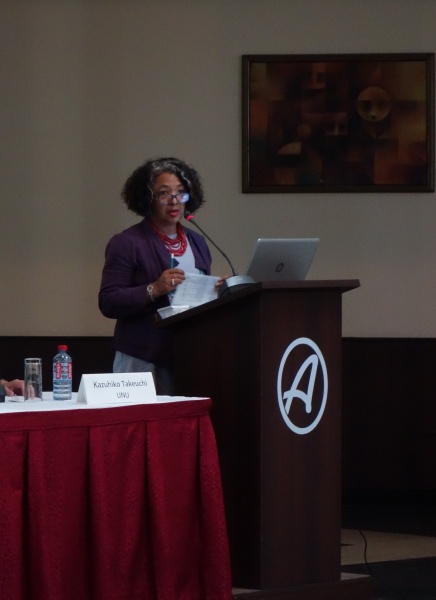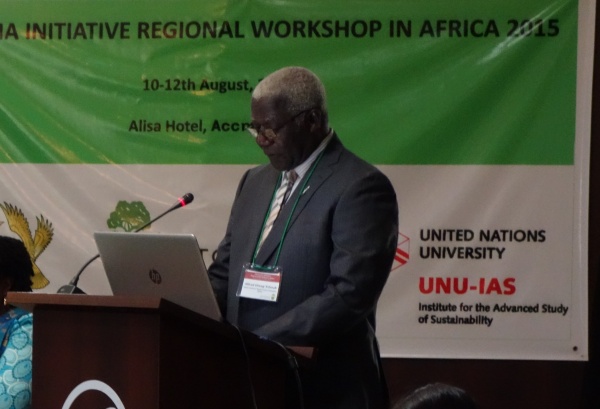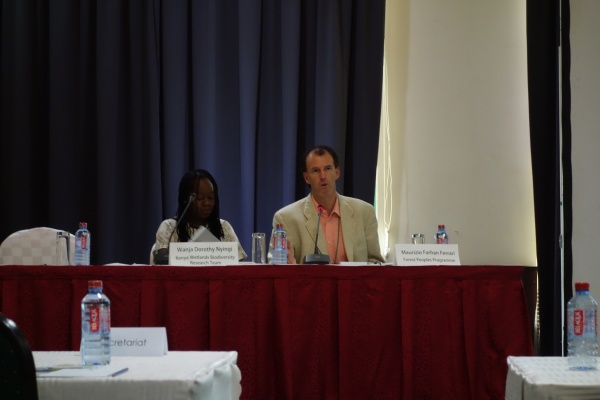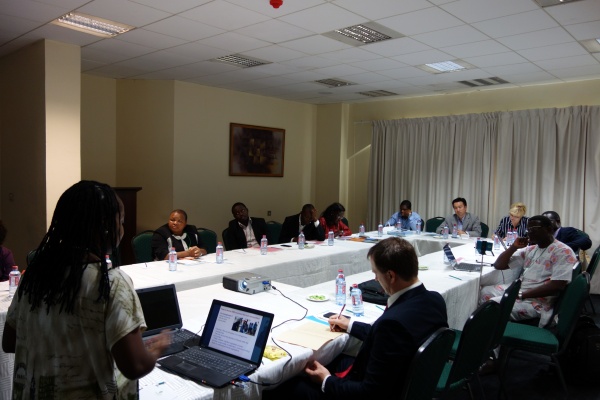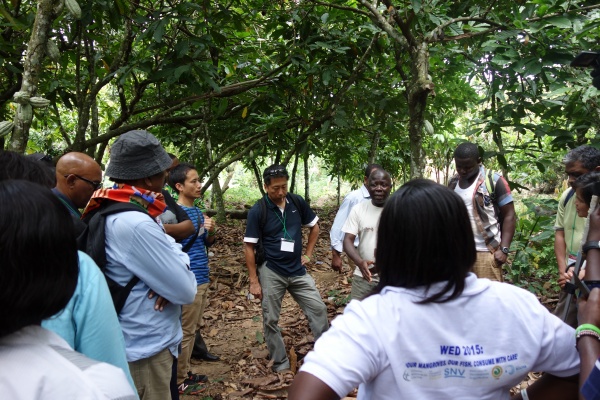Report
The official report for the Satoyama Initiative Regional Workshop in Africa has been completed and is available for download here: 20150810-12 Africa Regional Workshop Report
Workshop
The Satoyama Initiative Regional Workshop in Africa was held from 10 to 12 August 2015 in Accra, Ghana. This was the first Satoyama Initiative Regional Workshop to be held in Africa, following on earlier Regional Workshops in Asia (Kathamandu, Nepal, 2013) and Europe (Florence, Italy, 2014).
The Workshop brought together around 75 participants from 13 African nations and around the world for in-depth discussions of the issues facing SEPLS particularly in Africa. The event was co-organized by the IPSI Secretariat and, from the Government of Ghana, the Ghana National Biodiversity Committee, the Forestry Commission of Ghana, and the Ministry of Environment, Science, Technology and Innovation (MESTI). Local cooperating organizations A Rocha Ghana and Conservation Alliance also provided assistance in its organization.
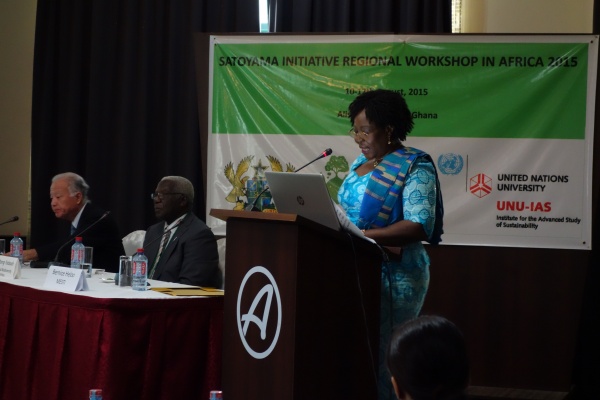
The Hon. Dr. Bernice Heloo, Deputy Minister for Environment, Science, Technology and Innovation (MESTI) of Ghana
An opening ceremony was held to kick of the Workshop, with guest addresses by the Honourable Dr. Bernice Heloo, MP for the Hohoe Municipality and Deputy Minister for Environment, Science, Technology and Innovation (MESTI) of Ghana, and David Kpelle of the Forestry Commission of Ghana.
The event was Chaired by Prof. Alfred Oteng-Yeboah, Chair of the Ghana National Biodiversity Committee, with plenary discussions moderated by Dr. Wanja Dorothy Nyingi, Coordinator of the Kenya Wetlands Biodiversity Research Team and Dr. Maurizio Farhan Ferrari, Environmental Governance Coordinator at the Forest Peoples Programme. Keynote speeches were provided by Prof. Kazuhiko Takeuchi, Senior Vice-Rector of the United Nations University, Dr. Tanya Abrahamse, CEO of the South African Biodiversity Institute (SAMBI) and Prof. Alfred Oteng-Yeboah, Chair of the Ghana National Biodiversity Committee.
Participants were divided into working groups for each of four primary ecosystems, Forest, Drylands, Aquatic and Agricultural, for in-depth discussion. Results from each working group were then brought to the plenary session for synthesis and overall lessons. A great deal of information was shared, and participants went away with a new appreciation of the good work being done in Africa and the importance of the Satoyama Initiative for further activities.
The third day of the workshop consisted of an excursion to the Atewa Range in southeastern Ghana, where cooperating organization A Rocha Ghana is working to create a National Park from a natural area that is currently threatened by mining and other human activities. A Rocha Ghana served as host and guide, providing a presentation at their field headquarters in the Atewa area, then showing participants some of the natural beauty of the area as well as mining pits and other production facilities such as a mushroom farm. The excursion gave participants a chance to see firsthand some of the issues discussed during the workshop as they are manifested in Ghana.
Building on the success of this event, the IPSI Secretariat looks forward to working more intensively at the regional level and organizing further Regional Workshops around the world in the future.
Documents
Programme: SI Africa RW Programme
Workshop Presentation Files
Opening Plenary
Introduction to the Regional Workshop by the IPSI Secretariat
Keynote Speech 1 “The Satoyama Initiative and societies in harmony with nature: resilient socio-ecological production landscapes for Africa” by Prof. Kazuhiko Takeuchi, Senior Vice-Rector, the United Nations University
Keynote Speech 2 “Introduction of Activities of South African Biodiversity Institute, SAMBI” by Dr. Tanya Abrahamse, CEO, South African Biodiversity Institute (SAMBI)
Keynote Speech 3 “How are we doing with our Ghanaian land and water scapes?” by Prof. Alfred Oteng-Yeboah, Chair, Ghana National Biodiversity Committee
Working Group 1: Forest
Presentation 1 “Restoration of Community Sacred Forest, Ghana” by Ms. Jacqueline Kumadoh and Ms. Evelyn Bafloe, A Rocha Ghana (Ghana)
Presentation 2 “Natural resources management by Rwoho forest edge community” by Mr. Imran Ahimbisibwe, Environmental Protection Information Centre (EPIC) (Uganda)
Presentation 3 “Restoration of Community Deforested Forest to Mitigate the Negative Effects of Climate Change” by Mr. Gideon Bukko, Civil Society Organizations’ Network for Sustainable Agriculture and Environment in East Africa (CISONET) (Uganda)
Presentation 4 “Restoration and sustainable management of sacred forests of the RAMSAR sites 1017 and 1018 in Benin” by Mr. Achille Lokossou, NGO CeSaReN (Benin)
Presentation 5 “Valorisation of genetic resources (GR) and associated traditional knowledge (ATK) for the sustainable management of sacred forest (SF) in Benin” by Mr. Mensah Bossou, NGO CeSaReN (Benin)
Presentation 6 by Ms. Nora Garmai Bowier, Sustainable Development Institute (SDI) (Liberia)
Presentation 7 “Landscape Strategy for Community Development and Knowledge Management for Tukombo- Kande Satoyama Initiative in Malawi” by Mr. Weston Mwase, Lilongwe University of Agriculture and Natural Resources (LUANAR) (Malawi)
Working Group 2: Drylands
Presentation 1 “Improving natural resource management and biodiversity conservation in Laikipia County” by Mr. Josephat Musili Musyima, Laikipia Wildlife Forum (Kenya)
Presentation 2 “Conservation for Tourism: A Threat to Community Livelihoods” by Mr. Mordecai Ogada, Conservation Solutions Afrika (CSA) (Kenya)
Presentation 3 “Environmental foundation and community activities: lessons from Tany Meva Foundation, Madagascar” by Mr. Rokotobe Tovondriaka, Tany Meva Foundation (Madagascar)
Presentation 4 “Improving the Agricultural Potential of Smallholder Farmers through the adoption of water conservation technologies in the White Volta Basin of Ghana” by Mr. Vincent Awotwe Pratt, Conservation Alliance (Ghana)
Presentation 5 “8 communities on the periphery of Mole National Park, Ghana” by Mr. Godwin Dzokoto, A Rocha Ghana (Ghana)
Presentation 6 “Protecting dry habitats for migratory birds and improving livelihoods in the Sahel” by Dr. Thandiwe Chikomo, BirdLife International West Africa Sub-Regional Office (Ghana)
Working Group 3: Aquatic
Presentation 1 “Strategic planning and management of aquatic ecosystems: Land, Water and Biodiversity” by Dr. Wanja Dorothy Nyingi, Kenya Wetlands Biodiversity Research Group (KENWEB) (Kenya)
Presentation 2 “Communication and mechanisms for effective knowledge sharing on SEPLS in Benin” by Mr. Josea S. Dossou Bodjrenou, Nature Tropicale (Benin)
Presentation 3 “Supporting Livelihoods: Nature Conservation with a Human Face” by Mr. Alex Damaliphetsa, UNDP GEF Small Grants Programme (Malawi)
Presentation 4 “Promoting catchment management activities in the middle shire using training and extension methods” by Ms. Cecilia Mphatso Chaluka, Ministry of Natural Resources, Energy and Environment, Department of Forestry (Malawi)
Presentation 5 “Keta Lagoon Ramsar site: Building Partenership for livelihoods and environmental enhancement And Multi-stakeholder Partnerships : Strategies to Make Rice the Voltaian cocoa” by Mr. Patrick Avumegah, Small Actions For Enterprise Ghana (SAFE Ghana) (Ghana)
Presentation 6 “Socio-economic impacts of the Bui dam on two resettled communities” by Dr. Elliot Haruna Alhassan, University for Development Studies (Ghana)
Presentation 7 “Adaptation to Coastal Erosion in Vulnerable Areas” by Ms. Vore Gana Seck, Green Senegal (Senegal)
Working Group 4: Agricultural
Presentation 1 “Nature and Livelihoods’ Current and Planned Activities in Agricultural Landscapes: Parklands, Pasturelands, Paddy Rice Fields, and Coffee Gardens” by Dr. William Olupot, Nature and Livelihoods (Uganda)
Presentation 2 “Traditional Foodways of Kenya” by Dr. Yasuyuki Morimoto, Bioversity International (Kenya)
Presentation 3 “Traditional knowledge Based Innovations for Adaptation and Resilience to Climate Change: The Case of Coastal Kenya” by Mr. Chemuku Wekesa, Kenya Forestry Research Institute (KEFRI) (Kenya)
Presentation 4 “Activities Program of National Agency for Great Wall of Chad” by Mr. Habib Gademi, Ministry of Agriculture and Environment (Chad)
Presentation 5 “Implementation of Nagoya Protocol on ABS” by Mr. Wilson Njing Shei, Ministry of Environment, Protection of Nature and Sustainable Development (Cameroon)
Presentation 6 “Biodiversity conservation within agricultural production landscapes” by Ms. Ernestina Osei-Peprah, Conservation Alliance (Ghana)
Presentation 7 “Securing biodiversity and ecosystem services of the WETO socio-ecological landscape in the mid-Volta region” by Mr. George Ortsin, UNDP GEF Small Grants Programme (Ghana)



